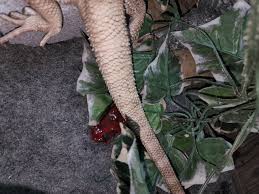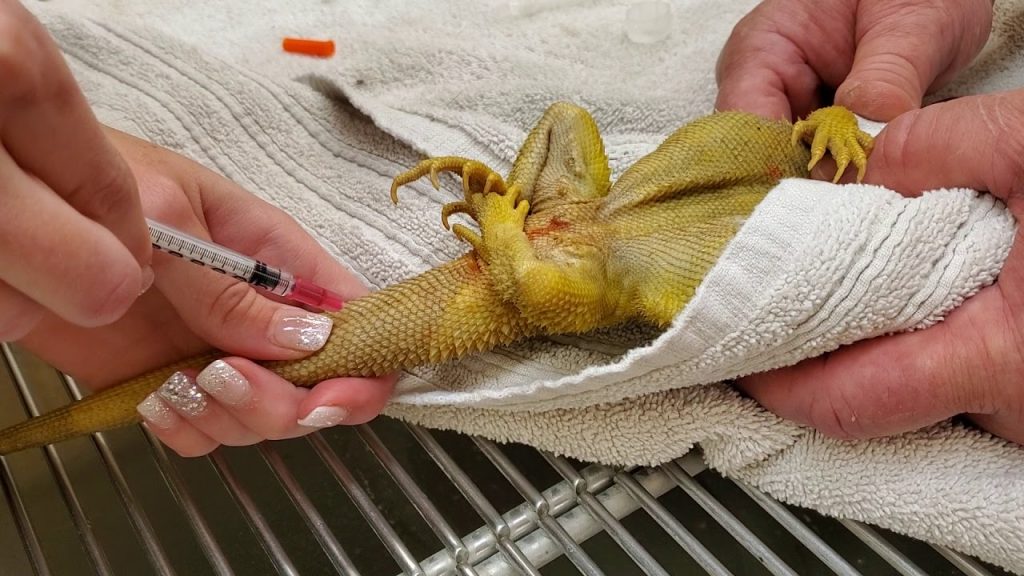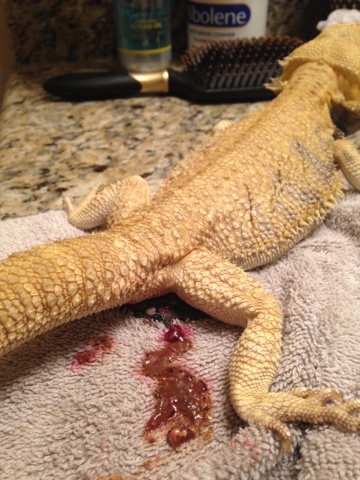Hey there! If you’ve noticed blood in your bearded dragon’s poop, you’re probably feeling worried and unsure about what’s going on. There are several reasons why your bearded dragon might have blood in its stool
Dietary issues, such as consuming sharp or indigestible objects, may cause internal bleeding. Parasites like pinworms or coccidia can also lead to bloody stool. Infections, including bacterial or viral diseases, may manifest with this symptom. Additionally, internal injuries from falls or rough handling can result in bleeding.
Let’s have a detailed look in this article at why your bearded dragon may be experiencing this disturbing symptom.
Common Causes of Blood in a Bearded Dragon’s Poop
Blood in a bearded dragon’s poop can be concerning, but let me explain the common causes for you
Diet-related issues
Bearded dragons are omnivorous reptiles with specific dietary requirements. Inappropriate diets or ingesting sharp objects can harm the digestive tract. This can lead to bleeding.
The Association of Reptilian and Amphibian Veterinarians (ARAV) says that meals high in sugar can upset the digestive system and make bloody stools 20% more likely.
Some foods, like spinach or rhubarb, can bother the intestines as they have lots of oxalates. Also, bugs with tough shells might scratch the insides when they’re eaten.
Impaction
If a bearded dragon eats something it can’t digest, like a big piece of bedding, it can get stuck in its digestive system. This blockage can make it hard for them to poop and can hurt their intestines. It might cause blood in their poop.
A study from the Journal of Exotic Pet Medicine suggests that about 35% of impaction cases happen because of using the wrong kind of bedding.
Parasites or infections
Parasite infections, like those from pinworms or coccidia, can swell and harm the walls of the digestive system. It can result in bloody stool.
Studies show that up to 80% of reptiles kept as pets have some amount of coccidia. These tiny organisms irritate the digestive system walls, causing swelling and bleeding.
Infections with bacteria or viruses, such as salmonella or adenovirus, can bleed the digestive system. These infections often spread through contaminated food, water, or contact with infected animals.
Internal injuries or health conditions
Traumatic injuries, such as falls or rough handling, can cause internal bleeding in bearded dragons.
The digestive system can also bleed because of health problems like ulcers, inflammatory bowel disease, or tumors. Stress, improper care, or genetic tendencies can make these conditions worse.
How Often Should a Bearded Dragon Poop?

The frequency is based on their age factor. As a result, newborns will have more frequent bowel motions than both young and adult beardies.
| Age Group | Poop Frequency |
| Baby Bearded Dragons (< 3 months old) | You should expect them to go to the bathroom at least once a day. Depending on the circumstances, they may go up to three times a day. |
| Young Bearded Dragons (3 to 12 months old) | As they grow, their frequency decreases. Young bearded dragons may poop several times a week. |
| Adult Bearded Dragons (At least 12 months old) | They typically go between 1 to 7 times per week, which is considered normal. |
What Does Healthy Bearded Dragon Poop Look Like?
Healthy bearded dragon poop is actually a mix of two kinds of waste. The first is solid digested food waste, and the second is yellow to whitish urine that has a softer consistency.
It is usually a medium to dark brown color, resembling the shade of chocolate or soil. However, slight variations in color can occur depending on the dragon’s diet, with some individuals producing slightly lighter or darker stools.
Healthy poop should have a firm but not overly hard consistency. It should hold its shape when expelled but still be pliable and easy to pass. The texture is comparable to toothpaste or soft clay, indicating proper hydration and digestion.
Normal bearded dragon poop is cylindrical or sausage-shaped, with smooth edges. It should not be overly thin or watery, nor should it be excessively large or bulky.
While it does have an odor, healthy bearded dragon poop should not be overly pungent or foul-smelling. A slight odor is normal, but exceptionally strong or unpleasant smells may indicate digestive issues or dietary imbalances.
Abnormal Signs in Poop
If you notice blood in your bearded dragon’s poop, it could mean something’s wrong. Blood might show up as red streaks or make the poop itself look reddish or maroon. This could mean your dragon has internal bleeding, infections, parasites, or injuries in their digestive tract.
Further, if your dragon’s poop isn’t its usual brown color, it could mean trouble too. Green or yellowish poop might mean their digestion or liver isn’t working right. Black or tar-like poop could signal bleeding higher up in their digestive system.
Poop that’s really watery or runny might mean your dragon has diarrhea, which could be because of their diet, infections, or parasites. On the other hand, if the poop is super dry or hard, it might mean your dragon’s dehydrated or has digestive issues.
Normally, bearded dragon poop has a bit of a smell, but if it’s extra stinky or smells weird, it could mean your dragon has digestive problems, infections, or their diet’s not balanced.
What Should I Do If I Notice Blood in My Bearded Dragon’s Poop?

If you notice blood in your bearded dragon’s poop, the most important step is to see a veterinarian as soon as possible. Blood in the stool can indicate various health problems, some more serious than others. A vet can diagnose the underlying cause and recommend the appropriate treatment plan. Here’s what you can do in the meantime
- Stop feeding your bearded dragon: This allows their digestive system to rest and prevents further irritation.
- Monitor your bearded dragon closely: Look for other signs of illness, such as lethargy, loss of appetite, unusual basking behavior, or changes in poop consistency.
- Gather information: Note the amount of blood present, the color and consistency of the poop, and any recent changes in diet or environment. This information can be helpful for the vet during their diagnosis.
FAQs
Here are responses to some of the frequently asked questions :
Parasites in bearded dragon poop may appear as small, white, or off-white segments resembling grains of rice or tiny worms.
However, not all parasites are visible to the naked eye, so a fecal examination by a veterinarian is necessary for accurate diagnosis.
Bearded dragon poop itself is not toxic, but it can contain harmful bacteria or parasites, especially if the dragon is sick or has an infection.
While handling poop, it’s essential to practice good hygiene by washing hands thoroughly to avoid the risk of bacterial contamination.
Liquid in a bearded dragon’s poop can be indicative of diarrhea, which may result from various factors such as dietary changes, infections, parasites, or other gastrointestinal issues.
It’s essential to monitor your dragon’s health and consult a veterinarian if diarrhea persists or is accompanied by other symptoms.
To clean bearded dragon poop, use a gentle cleaning solution and a soft cloth or paper towel to wipe the affected area. Ensure thorough cleaning and disinfection of the enclosure, substrate, and any accessories to maintain a clean and hygienic environment for your pet.
Final Thoughts
If you see blood in your bearded dragon’s poop, you need to act right away. Having blood in your pet’s stool could mean a number of health problems, such as a bad diet, an illness, or an injury inside your body.
To help make sure your dragon is healthy, you can take them to the vet, feed them a balanced food, and keep a close eye on their health. Make sure the area is clean and stress-free, and do what your vet tells you to do for treatment and care. Good care can keep your bearded dragon healthy and happy.

